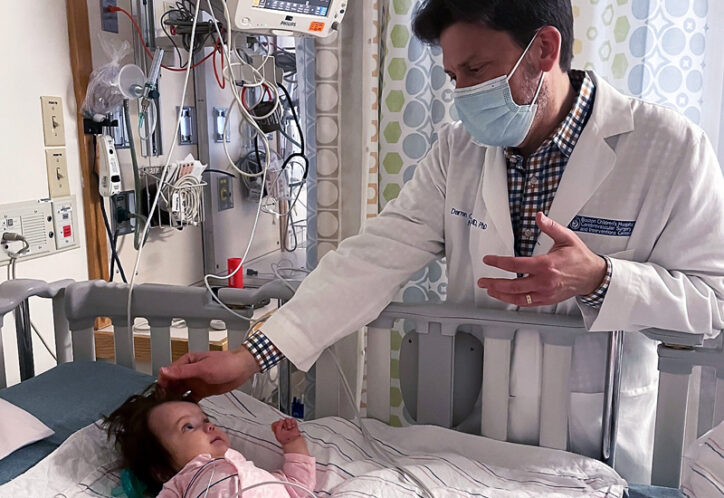‘To do what’s best for Marley’: One family’s experience with a vein of Galen malformation

Last summer, Savannah and Brian were eagerly awaiting the birth of their first child.
Savannah was scheduled to deliver their daughter Marley in late September, and they couldn’t wait to hold her, feed her, dress her up, and relish in the new-baby joy. But the Georgia couple soon learned that parenthood tends to throw plans out the window.
What was supposed to be a routine prenatal ultrasound at 36 weeks showed a vein of Galen malformation (VOGM) in Marley’s brain, and three days later, Savanah underwent a c-section due to preeclampsia.
In the short time between learning of Marley’s VOGM and her arrival, Savannah and Brian dedicated themselves to finding her the best care possible. Their dedication led them to Dr. Darren Orbach and the Cerebrovascular Surgery and Interventions Center at Boston Children’s Hospital.
We just wanted to do what was best for Marley. We want her to be in the best hands possible with the best team possible, and we were going to do whatever we could to get that for her.”
– Brian, Marley’s dad.
Finding the best team for the job
A VOGM is a vascular malformation in the brain in which the capillaries that slow the blood flow from high-pressure arteries to low-pressure veins are missing. The resulting rush of blood to the brain causes the main collecting vein to expand significantly and form a large round structure that is easily seen on brain scans. The rapid blood flow also often circulates back to the child’s heart at such a rapid rate that it is forced to work overtime to get blood to the rest of the brain and body, potentially leading to heart failure. If left untreated, VOGMs can be life-threatening.
“When we first found out about Marley’s condition, I immediately started researching everything I could to learn more about her diagnosis, including joining VOGM support groups, reading everything I could online, and watching videos,” says Brian. “That’s how I found Dr. Orbach. His videos explained vein of Galen malformations in ways we could clearly understand, and it was clear that he was an expert in his field.”
VOGMs are most often treated through embolization, which blocks or closes impaired blood vessels. While a relatively common procedure in adults, embolization in infants and children is a more specialized focus.
“Everyone we spoke with who had been through the same diagnosis was saying how important it was to connect with doctors who have experience treating vein of Galen malformations since the diagnosis is so rare,” Brian says. “From everything I was seeing, Dr. Orbach was the best person for the job. He was the person with the most experience.”
Charting an interstate of care
Just hours after her birth, Marley was transferred to an Atlanta pediatric hospital, where her heart function could be monitored in a neonatal intensive care unit (NICU). To the new parents’ dismay, Savannah had to remain at the delivery hospital to recover from her c-section. With his daughter on one side of the city and his wife on the other, Brian got to work exploring next steps.
The first person he got in touch with was Jennifer Judge, a nurse practitioner for the Cerebrovascular Surgery and Interventions Center at Boston Children’s.
“Right from our first conversation, she really made us feel at ease,” Brian says.
Jennifer immediately looped in Dr. Orbach, who Brian and Savannah praise for being so accessible.
“He scheduled a call with us as soon as he was able to review Marley’s MRIs and scans,” Brian says. “He walked us through his experience with treating vein of Galen malformations and what the treatment process would look like for Marley. So, it seemed like a pretty easy decision for us to go to Boston.”
Next came figuring out when.
Making the journey

For many vein of Galen malformations found prenatally, the baby’s heart failure is severe enough that emergency embolization is needed within a day or two after birth. For others, embolization can be delayed and takes place at 4 to 6 months. For Marley though, things fell somewhere in between.
While she didn’t have overwhelming heart failure right after birth, Marley’s VOGM did cause her heart to work too hard, and she was burning too many calories to grow and thrive properly. Her care team in Atlanta recommended she see Dr. Orbach and his team as soon as possible. So, at just about three weeks old, Marley made her first trip to Boston. Once in the Boston Children’s NICU, tests and evaluations came back with reassuring results and the NICU team was able to tune her medication regimen so that, a week later — at almost one month old — Marley went home for the first time.
At home in Georgia, Marley was monitored remotely by Dr. Orbach and the Cerebrovascular and Surgical Interventions team. The hope was for Marley to reach 4 to 6 months before needing embolization, but after about a month, she experienced complications, so Savannah and Brian connected with the Boston Children’s team to determine the best plan of action. They returned to Boston right before Thanksgiving so Dr. Orbach could begin a phased approach to closing off the blood flow feeding Marley’s VOGM. Two embolizations later, Marley was home in time for Christmas.
They returned to Boston Children’s a couple more times over the following months for further treatment, including one last embolization.
Having faith through it all
Today — fresh off her first birthday — Marley is the same happy, smiley baby that she’s been since Day One. After all they’ve been through, Savannah and Brian are looking ahead.

“This journey has been very humbling,” Savannah admits. “Sometimes it’s easy to get overwhelmed by the unknowns of the future. But when I look back and see all that Marley’s overcome, it reminds me not to be fearful. I do sometimes still grieve my plans for ‘normalcy,’ but Marley is such an incredible light, and we are so grateful for her.”
Learn more about the Cerebrovascular Surgery and Interventions Center at Boston Children’s Hospital.
Related Posts :
-

Treating a ‘unicorn’: Norman’s incredible journey with vein of Galen malformation
Norman Flores is near the top of his class at his Montessori preschool. He can recognize a Tesla just from ...
-

Fetal treatment for vein of Galen malformations
Vein of Galen malformations (VOGMs) are rare, life-threatening vascular malformations that often cause heart failure in neonates. The preferred postnatal ...
-

Back from the brink: How Boston Children’s saved my life
I was first rushed to Boston Children’s Hospital on my very first night of summer vacation in June 2015. I ...
-

A model patient: Alexia’s triumph over moyamoya disease
If you’re lucky enough to get time on Alexia’s packed schedule, you’re in the company of a ...





